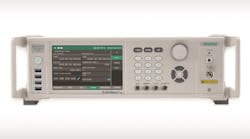Analog Signal Generator Touts Signal Purity, Frequency Stability Up to 70 GHz
This article appeared in Microwaves & RF and has been published here with permission.
This article is part of Microwaves & RF's IMS 2023 coverage.
Anritsu addressed the ever-intensifying demands on test & measurement solutions by adding the MG36271A to its Rubidium high-performance analog signal generator family. Covering from 9 kHz to 70 GHz, it's built to handle the latest extreme high-frequency designs. Offering high levels of signal purity, output power, and frequency stability, the MG36271A targets the Q/V frequency band, providing significant benefits to aerospace and defense, test and measurement, communications, components, and research applications.
The MG36271A has phase noise of –136 dBc/Hz (typical) and –140 dBc/Hz (measured) at 10 GHz and 10 kHz offset, with very low harmonics for increased signal purity. It has an output power of +9 dBm at 70 GHz. Derived from an atomic clock reference, Rubidium’s frequency stability (Allan deviation) is 8x10E-12 per 100 seconds.
The MG36271A offers an extensive set of modulation, frequency sweep, synchronization, and level control capabilities; modulation capabilities include AM, FM, phase, and pulse. In addition, the MG36271A offers pulse generation capabilities to test pulse radars.
The 3U-high Rubidium MG36271A has a 7-in. touchscreen and traditional keypad/dial interface, with four USB 3.0 ports on the front panel, a GPIB port on the back panel, and a 10/100/1000 Ethernet port. The MG36271A can be controlled remotely through standard IVI-C and IVI.NET drivers and via support of SCPI/Native commands.

